#sandman essay
Text
“I tried so hard, and got so far, but in the end, it doesn’t even matter”:
The Awkward Meta-Tragedy of Neil Gaiman’s The Sandman
In which I thoroughly (over-) analyze the ending of this classic work in seven parts, with perhaps gratuitous references to 2000s pop music thrown in. The introduction and links to subsequent posts are below:
[Note: a link to a google doc containing the whole essay will also be at the end of this post, if you'd rather read it in that format instead of clicking links to the separate pages]
Introduction
I was warned that Neil Gaiman’s book series The Sandman was a tragedy. A post on tumblr, circulated not long after the successful Netflix adaptation’s first season released, warned new fans to not get their hopes up, to understand that the books were a Literary Tragedy to be taken seriously, and not to get carried away with fun cutesy shipping without the knowledge of what the source material would be like. However, the post carefully, and helpfully for those hoping to avoid spoilers, did not say in what manner the books constituted a tragedy.
So, when I first came to the end of the final installment of the series, I was shocked.
This was not like any tragedy I’d expected. And it felt… icky. It felt incredibly, shockingly, pessimistic.
Needless to say, massive, MASSIVE spoilers from here on out—you have been warned. Also content warning for discussions of depression, suicidal ideation and suicide, mentions of misogyny, and mentions of transphobia.
Also note that this isn’t intended as necessarily negative towards the original work, but more about the common fandom interpretation of it, as well as acknowledgment that, for better or worse, it is “of its time” and doubtless going to come across differently to a modern first-time reader. Also, this is just my own interpretation, I’ve been told I tend to interpret things pessimistically, and I’ve only just read the books as of 2022, so I in no way position this as a definitive analysis, nor even necessarily a correct one.
Continue to:
Part 1: Tragic, but not a Tragedy… Unless you get weird about mental health
Part 2: Hob Gadling—How to win by doing nothing?
Part 3: “Façade”—So much foreshadowing, so little time
Intermission: A Midsummer Night’s Dream
Part 4: Damn Daniel, Back at it again with the (symbolic) white vans
Part 5: “It sure is exhausting always rooting for the anti-hero”: Should We Even Care?
Part 6: “I reject your reality, and substitute my own”: Maybe There is Hope After All
UPDATE: I have also written a "bonus chapter" of this, focusing on Season of Mists, HERE
Tagging those I believe interested: @duckland @roguelov @notallsandmen @lizajane2 @ambercoloredfox
@serenityspiral not sure if you want to read this before you finish the books, because this is literally about the ending and it might kinda ruin the experience if you're completely spoiled
@onehundredandeleventropicalfish I'm gonna be bold and tag you and hope I'm not completely wrong
#the sandman#the sandman comics#the sandman comics analysis#the sandman comics meta#neil gaiman's sandman#literary analysis#original post#my writing#masterpost#the sandman comics spoilers#sandman essay
330 notes
·
View notes
Text
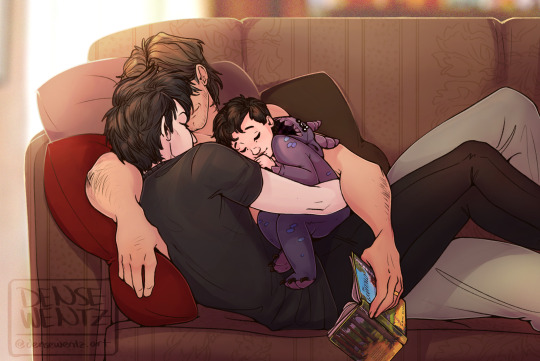
more dreamling dad au bc thats just what i do now apparently
i like lazy afternoon naps and so do our boys
#dreamling#hob gadling#dream of the endless#morpheus#the sandman netflix#sandman fanart#a few people have asked me what the babs name is#ive been calling him Kian#and he gets jealous of Nightmare and wants to be scary too sometimes so his dad made him that horrific onesie#to kian's exact specifications thank u#my art#its important to me that people know kians got dreams dark hair and flair for dramatics but#hes also got hobs big dumb sunshine brown calf eyes that he flashes to get his way bc he also has hobs effortless charm#i also headcanon as he gets older he secrets handfuls of sand into his pockets from EVERYWHERE bc he wants to be like his dad#and hob has to be the sand police and has to make kian turn out his pockets on the doorstep every time they come home from anywhere#bc theres only so much vaccuuming even an immortal man can take#and kian does so but petulantly and while sporting dreams patented Imperious Pissy Face#they have a rule that kian is allowed to stomp as loudly as he wants to his room but isnt allowed to slam doors#in this essay i will-
2K notes
·
View notes
Photo
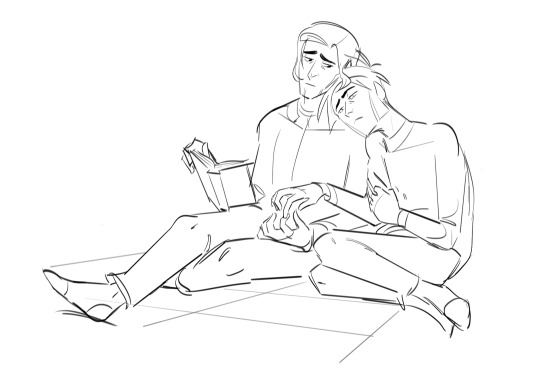
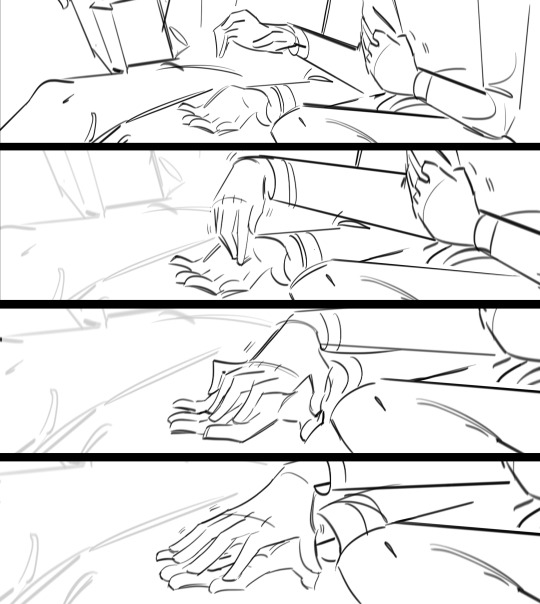

Relearning touch.
I am SOFT FOR THEM.
inspired by this fic. (darkfic! mind the tags)
#dreamling#hob gadling#dream of the endless#the sandman#sandman#darkfic#tw#listen i have a TED TALK about this fic and how dream is gonna have to re-learn how to process physical contact. IN THIS ESSAY I WILL-#still listening to lay by me by ruben#i am still crying#the fic is dark#tw rape#a lot#the art tag
2K notes
·
View notes
Text
To the people that are saying Dream is emotionless and cold…did we watch the same series????
did we not see him cry???
Did we not see him smile??
Did we not see him be unsure of himself??
Did we not see him angry??
Did we not see him mourning???
He has literally felt every emotion that could be named and more.
So, once again, did we watch the same series???
#morpheus the sandman#the sandman netflix#dream the sandman#the endless#the dreaming#dream of the endless#the sandman#neil gaiman#tom sturridge#in this essay i will
1K notes
·
View notes
Text

OK, so you are looking at a comic I did back in 1990 that changed my life in so many ways. Not the way you’re thinking of.

It taught me some very important lessons about the comics business, fame, and more importantly, how fame doesn’t rub off. And how having reasonable expectations will keep you centered and on the right path.
Many people don’t internalize this lesson. And now that our industry is no longer just Fandom Culture but is now Celebrity Culture, we see more and more creators with incredibly unrealistic expectations getting into comics, expecting the sun and moon to rise out of whatever they do, and being disappointed and frustrated when they don't.
I got occasional mainstream comics work in the early 1980’s, but I was still looking for my big break years later, especially since a major gig I was working on got shelved forever. I cannot even begin to tell you just how much being out of the eyes of the market for YEARS at a time while you work on a gig - and then the gig never coming out - can absolutely sink your brand.
Nowadays we have social media. Back then, you had no way to be seen if your work wasn’t being published. People forgot about you in about 15 minutes.
So when I got a gig working on Amazing Spider-Man, you bet I was thrilled. And even more thrilled when the darned thing sold like crazy. This issue of Amazing Spider-Man outsold previous Todd MacFarlane issues. And I knew Marvel was looking for a new artist. Huzzah! I outsold Todd! Maybe the new artist should be me!
You can imagine how pleased and excited I was to go to conventions and sign copies of a book that hundreds of thousands of fans bought. It was fun getting my first big lines of fans. I thought it would be a perfect opportunity to push my other works to them as well.
But few Spider-Man fans were interested in my other books. They could not possibly care less about Amethyst: Princess of Gemworld, that’s for sure.
The Spider-Man glow was gone in no time. And Marvel picked Erik Larsen to be the regular artist.
I might as well have never worked on Spider-Man for all the long term good it did. Were it not for that one brief shining moment of royalty check (which was darned good,) it had no effect on my prospects.
While I got more work at Marvel, I was scrambling to make a living and took on too much, doing sub-par art that didn’t please anyone.
I realized pretty quickly that Spider-Man’s fans weren’t my fans. I might as well have been a spark plug on that issue. Fans lined up, got me to sign a book, and forgot about me the next day.
(Yeah I know some people say they love that comic, but I often hear from people who tell me how much they hated my art back then and how much they grew to love it later. Thank you, I’ll take it.)
Anyway, it was all a very tough lesson. But I appreciate that I learned it early before I got to the point where I could never learn it.
Fame isn’t transitive. It doesn’t rub off.
The public needs more than your proximity to something they know to transfer their attention to you and your work.
A lot of people got a taste of this in the early 1990’s. For a while, self-publishing was The Big Thing. I self published A Distant Soil and did well for some years, at one point making more than I could in mainstream comics, until the market crashed in 1996. A lot of creators thought if they just went to Image Comics, they’d all be millionaires.
That didn’t happen for almost all of them.
An old frenemy saw how well I was doing self publishing and assumed that if they just transferred their mainstream comics fan base to their creator owned work, they’d get rich.
But that didn’t happen. Their self-published work sold a fraction of what mine did. Their project died in the red. I never got my art back, including work from an unpublished future issue of the project. I remember being with this creator at a show and enduring their fury at how fans weren’t paying attention to them and their project.
How could this happen? They were a star mainstream creator!
The mainstream cred did not transfer to the other work. The fans wanted the famous characters, not the indie project they were trying to push.
There was no point in explaining this either. I’d learned this lesson myself, but this person never learned it.
Most people never learn it.
How is it that I work on Famous This or with Famous Person and why am I not famous Too?
Because fame isn’t transitive.
I’ve worked on projects that got a lot (and I mean a lot) of buzz, but there are projects that didn’t necessarily set the world on fire that did more for me as an artist and for my finances than “big” projects did.
Reign of the Zodiac and The Book of Lost Souls, both early/mid 2000’s comics with mediocre sales set me on a solid financial footing because they are two of the few regular monthly gigs I’ve done in all my years working in comics. That monthly paycheck paid more than the projects I’d done before them. The financial and emotional stability was beyond price. I loved everything about those projects.
Except for their premature demise.
The one and only famous project that had a major transformative afterglow effect re: me and my work was Sandman. I met Neil Gaiman years before I worked on Sandman, before he was famous. I only worked on two issues. Many other artists were far more important to the project than me, of course. Then I went for nearly twenty years solid without working with Neil at all except on a pinup and short story adaptation of Troll Bridge that almost no one remembers.
I started working with Neil again when he saw some art I did for a book for Tori Amos back in 2008. Tori Amos fans didn’t flock to my side when they saw it, yet another example of how Famous People Fame Doesn’t Rub Off. But I lavished time and attention on the project, did the art on spec with a completely new style and process, and showed it to Neil. I asked Neil if he’d take a chance at working with me again after lo, these many years and let me have a go again at adapting the story Troll Bridge that I’d botched in 1998. Neil said yes.
After The Book of Lost Souls got killed back in 2006, I could barely get arrested in comics and I wasn’t sure I had a future. I was shocked that Neil said yes.
That Tori Amos job reestablished my working relationship with Neil and brought me to Dark Horse Comics, a publisher which had shown little prior interest in my stuff.
It took me years to complete Troll Bridge and during that time, Peter David contacted me to ask if I’d work on Stan Lee’s autobiography. That came out of the blue, and boy did I appreciate it. It sold like crazy, which was unexpected, really.
So I went from Not Being Able to Get Arrested in Comics in 2008, doing 1$ sketch cards and working for page rates I worked for in 1986, to Not Being Able to Remember What I am Doing Because I have Too Much To Do in 2022. I mean literally couldn’t remember I did a pinup for a gig back in February, and I not only forgot about it, I didn’t know it was published last June.

It looks like I had a super fast and fun run up if you’re just looking at my highlight reel. But it wasn’t. I’ve had peaks and valleys, (a few very fine peaks, the best being around 1993 and the other now), and sometimes the “big time” projects I thought would make my career held me back worse than the “small time” ones. “Big time” projects got shelved or came and went, quickly forgotten, and I said no to other projects while I was busy, and the one that got away ended up getting made into a multi-million dollar film franchise that would have set me up for life.
Ow.
If just being next to a famous person or working on a famous project was a guarantor of success, than I’d have been hugely successful every day of my adult life.
That is not how it works.
Even the famous people are not as all that as you think, otherwise you wouldn’t see so many actors with haunted looks on their faces at conventions.
I met Neil before he was famous, but it took over thirty years for me to establish a solid working relationship with him.
Thirty.
Years.
I’ve worked with famous wrestlers, actors, musicians, politicians, a Pulitzer Prize winning author, and on almost every single major licensed character there is. And I’m not super-famous or rich. I mean, I never wanted to be famous in the first place, but I’m not completely unknown in my field, and I’m not poor (anymore). Still, seriously, folks. I’m not going to movie premieres and living in Hollywood.
I actually get asked about that, and I think it’s so funny.
I was watching some recent art auctions, and I was absolutely shocked to see original pages by an Eisner-nominated creator go for rock bottom prices, mainstream interiors at around $50 per page. I could not believe it. This artist is over 40 years old. I wonder if things will turn around for them.
Time will tell.
In the end, it’s not all about the people you’re standing next to. Or the character. Or the company. Or the award. And it's certainly not all about you.
Fans are here for you one minute, and forget about you tomorrow. Then you get $50 for your Eisner nominated art.
Art either takes off or it doesn’t. You either take off or you don’t.
And then you can fly too close to the sun and fall.
Worse yet…you just fade and no one even notices that you crashed beautifully into the surf.
If people knew what the magic formula was, they’d be selling it and everyone would have what they want out of their art life.
But there is no magic formula. There just isn’t.
Everyone wants to be special to someone. Especially artists. Everything you create is special to you.
But it is extremely rare that what you create is as special to others as it is to you. Sometimes artists are just like everyone else.
Here and gone.
Fame and success is not transitive. And they're not forever.
That’s the lesson.
I'm working on Good Omens right now. The Kickstarter pre-sign up news is here. No, it's not an icky newsletter, it will just let you know when the Kickstarter launches.
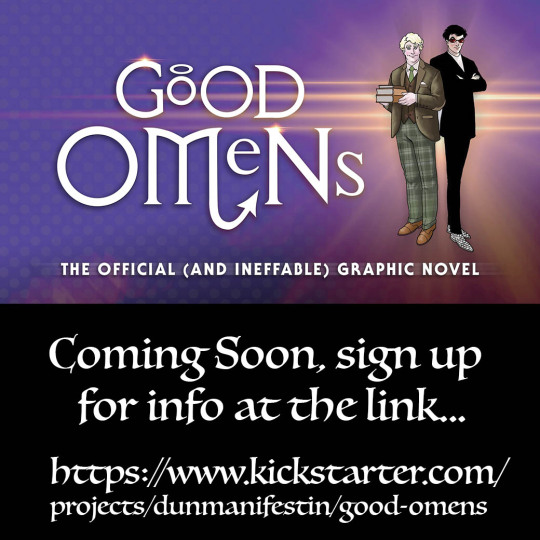
I have a Patreon. I'm funding the final volume of my space opera A DISTANT SOIL with it, but I won't be working on it again until Good Omens is complete. I have one of the most active and productive Patreons on the site.
I'm also on Twitter and Facebook and Instagram. Not too much though, they are distraction pits.
Make art because you love it. Because the rest...well, good luck. If it happens for you...it happens. And I hope it does.
153 notes
·
View notes
Note
1589 got me feeling&rambling and I'm so sorry beforehand that I can't keep it short and simple, as would probably befit the thing. Feel free to ignore if not interesting to you, still you are the one that comes to mind when thinking about Hob being morally grey.
That scene is always so painful to watch, mostly because Hob is behaving like such a sorry fool. He has really decked himself out to impress his stranger and misses the mark so dramatically.
(Whereas Dream seemingly has not held back either - I mean it's easily his hottest look, you can't tell me he didn't mean to make a lasting impression. So much disappointment on both sides.)
Cringe Hob as part of the dark Hob spectrum, his self-importance/selfishness showing - of course it's not pure fun to watch, but I'm always so fascinated by that flicker of pain (foreshadowing shame) that comes right to the surface in all his put on show, just before he orders the lamb. The contrast makes for a very intense moment, imo. And I am wondering, has he really left all of this behind by 1889? Or is he simply more smooth by that time (that's what I'm getting from the show) ? In fanfics his flaws are mostly depicted as minor or serving a good end in modern times, he is always such a goodie by then (and I love him, of course). But can we imagine just a trace of more questionable/offputting Hob in the mix (if only on impulse) - to be clear, I have no idea how that would work. Or should we just be grateful that that lies behind him (it certainly makes for a much more likeable character and a nicer love story)?
(me force feeding myself more of the horrible stuff I just wanted to avoid looking at)
It's a beautiful contrast: opulence and insecurity. Success and asking still for validation. I have Thoughts on each meeting (please send me asks about them) - ostensibly the very first fannish thing I did for this show, and also in my adult life, was rewatch the meetings and pause constantly and take - oh holy Christ over 4,000 words of notes.
I propose Hob is not acting like a sorry fool. Sure, some bits are clearly played for comedy. Hob is selfish, self-important, and given to hedonism. He is concerned primarily with his own comfort and the personal pleasures of life. But I blame 1589 pretty solidly on Dream. In 1489, after being asked what his experience is like, he answers Dream with an inarticulate statement spoken by a true person who just Digs The Experience of Experiencing: it's 'fucking brilliant' and 'all changing'. Dream asks how, Hob literally looks around the room like a student who forgot an essay was due, and names chimneys and playing cards. Handkerchiefs. Simple things - still sensual things - but simple ones. Certainly no sociopolitical discourse here. What will you people think of next, says Dream, deeply sarcastic and visibly disinterested. And Dream also asks him: but what is Hob doing with his time? This, too, he is under-prepared to answer. Soldiering, banditry, bit of printing press work. Hardly enough to impress this supernatural lord, and Hob can tell.
When he is granted, explicitly, another 100 years by Dream, it is not only a relief, but I think a part of Hob squares its jaw in that moment and says: I'll show him - I'll show him what I can do in a century, I'll earn his pleased regard. Not necessarily because he's even, you know, madly in love at this point, but because he's in it for the living, does not intrinsically have great ambitions, but does have someone who has a) seemingly granted him this greatest gift and b) is unimpressed with what he's doing with it. And he's lost everyone he knew. Dream is now his oldest acquaintance, and wouldn't it be nice if he liked Hob?
He knows only the language of what impresses other men, and this is what he achieves. But to Dream, both Hob's socially-valued successes and his deeply personal ones are terrifically uninteresting. They are not New Dreams To Spur The Minds Of Men. There is no new story in a man seeking fortune and having a wife and a child he loves. He is ancient as the first dreaming thing, and he is Bored. He is, in fact, soured on this meeting from the outset, when he says "Hello, Hob," which on my watch struck me, apparently, as extremely bizarre and of having a real air of Hob being In Trouble. (The only other times Dream says his name are at the first, looming and omniscient, and in 1789, - 'I suggest you find yourself a different line of business, Robert Gadling'. He does not say it at their modern meeting.)
I mean - how would you impress someone? Someone who was interested in your deeds? Putting on a nice little dinner and catching them up on your life, talking about your family, seems a decent enough shout. It's not like you can ask him about his life, he won't offer information when asked and only sometimes will correct you if you venture your own guesses. (see also: 1889 foreshadowing) Hob is feeling proud and triumphant, feeling like he's come far. He is obviously a bit obnoxious about it, but I do think Dream shows off his flaws far more in 1589 than Hob does.
Hob's greatest sin, here, is trying to be liked. His greatest regret is almost certainly not the spread he put on, but the moment he was really, truly, earnest - not underscored even by a subsequent joke - the moment he declaims that this is what he had imagined Heaven to be like (safe enough to walk the streets; good food; good wine) - Life is so rich, he says - and Dream looks away to listen to Will Shaxberd, and we watch real time as Hob's expression collapses. He had leaned forward nearly out of his chair in enthusiasm, and now he shrinks back, reminded again of the dangers of earnestness: being alone in it. Being ignored. Better to make a joke of things, which is why he tells so many around Dream, especially after being more open - it's clearly a matter of habit. (It is also, incidentally, absolutely unappealing to Dream, who really and truly looks at him for the first time in 1689, when he is stripped of the social niceties of men and reigns nothing in.) He eats. He frets. He has had another century, and he has failed to impress the stranger.
The worst moment, I think, is that Dream does not renew their compact. He does not ask Hob if he still wishes to live, and Hob does not get the opportunity to say "Oh, yes." He was given this gift for one reason: the stranger was curious about his experiences. Does the stranger seem still curious about him now? I wonder, honestly, if Hob thought he would see another meeting.
Has he really left that all behind by 1889? No - you hear it in his own words, 'People are almost always better than you think they are.' - the earnesty, and then the joke - 'Not me, though, still the same as ever.' Except it's not really a joke, is it? Hob is saying to Dream, I know you don't think much of me, well, I don't pretend to think much of myself. He still wants Dream's validation, of course, he's just trying to earn it differently. (It goes poorly.) He's smoother, but also more frustrated, more fed up, more hungry for knowledge of his stranger; and I think that's such an interesting point in time for him. I think he leaves little behind, and what he does leave behind, he dreams of. He's changed so much and so little, and I think you could really go in whatever direction you want depicting that and be convincing.
I can't speak to the fanon on Hob's flaws because I don't read nearly as much as I wish I could. While I don't personally think 1589 Hob was actually that questionable or offputting - at least no more than most people would be in that situation - I would love to see a modern fic where has the same flaws he's always had, where they come up maybe different than they would have several centuries ago, but they absolutely exist, it does have plot consequences. Bonus points if he is not being offputting for the purposes of rescuing Dream from the fishbowl - if his flaws exist independent of his relationship with Dream altogether. Bonus bonus points if Hob is the one whose character development needs to be developed and Dream is in a better place than he is. If anyone has fic recs feel free to drop them in the comments!
P.S. 1589 Dream, wow, yes, for sure. 10/10 would babble and get walked out on
#the sandman#dreamling#century meetings#meta#dream of the endless#hob gadling#the amount of them just not understanding what the other person wants or is offering at first is incredible#1489#1589#an essay#i really do think the dynamics in the first few meetings are SO INTERESTING and precarious
466 notes
·
View notes
Text
We’re going to talk about the 1889 meeting. Why? because I’m back on my bullshit after drawing this, and am not done dissecting the episode quite yet.
I want to begin where it all starts going wrong, which in my opinion, is when Dream tells Hob Lushing Lou’s real name. By doing this, Dream inadvertently reveals more of his inhuman nature (knowing the real name and backstory of a person he’s never met). Hob looks at him and says “How do you know all that?”, and Dream deflects by looking down at Hob’s cup and responding with “Your cup is empty, you need more wine.”
Hob doesn’t take the bait. Instead he continues, “You knew Lady Johanna, you know Lushing Lou, you know everyone, don’t you?”. He pushes Dream, because Hob only has scraps of information after centuries of meeting with the man and he wants to know more. Every time they meet he shares his whole being with His Stranger, shares entire lives he’s lived and names hes taken. He’s seen Hob at his best and his worst, and what does Hob know in turn? that he’s immortal like him? that he has some weird sand that subdues people? and now, apparently, that he knows everyone and the life they’ve lived?
Still, Dream deflects; “Saw her again, you know.”
And Hob gives in.

I love how he just looks at Dream for a second, then smiles almost bitterly at the table and puts his cigar down before looking back up and indulging Dream. He see’s that this line of conversation will get him no where, that His Stranger is avoiding this subject and will continue to do so whether Hob joins him in that or not. So Hob looks down at the table in acceptance, as if he didn’t expect to get anywhere with his statements but was disappointed nonetheless, and looks back up with a small smile to indulge Dreams avoidance.
But Hob doesn’t let go of it.
When Dream tells him that Lady Johanna undertook a task for him and succeeded, Hob again highlights the fact that he knows practically nothing about His Stranger- albeit in a more straightforward way.
“That might be the only thing I’ve learnt after 500 years.”

To me it feels like Hob doesn’t care about the information itself- Lady Johanna doing anything some 100, 50, 20 years ago means nothing to Hob right now. Its who the information is coming from, what it represents. Dream might have avoided divulging why he knew so many people’s names and stories, and Hob might have temporarily allowed him to, but he had never truly dropped the subject. And the way he looks- Hob naturally smiles a lot, and even now he can’t stop the way his lips quirk despite it being at his own self-deprecation. You can see it written all over his face here and in the above sequence when he puts his cigar down; the humourless way he smiles at his own misfortune.
But Hob is nothing if not persevering, so he brightens up the mood, talks about how people are almost always better than you think they are.

(i just thought this was a nice pic, sorry)
We could also read him opening up to Dream (talking about his mistakes, learning from them even though it feels like it doesn’t stop him from making them- perhaps a little foreshadowing for whats about to come next) as a way of trying to get Dream himself to open up. He is honest with Dream, as he always has been, in the hopes that tonight is the night His Stranger becomes a little more honest with him (though with our current track record of the night, this doesn’t seem likely, but as Hob says...he cant seem to stop making mistakes, and i wonder if this is something he thinks often of himself when Dream fails to meet him in 1989).
Dream looks at him like this:
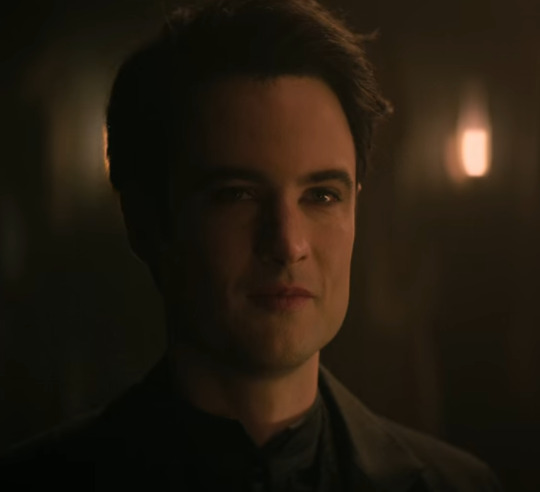
And maybe its that not-quite smile he gives Hob after his honesty, that emboldens him to say “I think it’s you that’s changed,”. And this, my friends, is where shit well and truly hits the fan. Because suddenly that small smile is gone, though not in anger yet, and Dream asks “How so?”
We all know what happens next. Hob, correctly, supplies the idea that the reason Dream continues to meet him every century, despite them both knowing at this point that Hob will never give up on life, is because His Stranger seeks friendship. Hob understands, of course he does; Dream is the only living constant Hob has, he’s already referred to Dream as his friend because to Hob, that’s what he is- regardless of how much he does or doesn’t know about the man.
This is of course when the iconic “YyOUU dAAREREeee,,.,..1..1.1....,,,,.” scene happens, and Hob briefly tries to backtrack. He averts his eyes immediately and looks at the table (a recurring staple in avoidance tonight), gesturing with his hand as he says “No, look, I’m not saying-”, as if trying to explain it any better would make Dream accept it. I like that he seems to backtrack just a little bit, only to double down on it a few moments later. He put himself out there a bit by boldly stating that Dream sought companionship with him, that His Stranger was lonely, and it was evidently ill-received so he backpedals to reduce the damage of his words.
Yet when Dream says “You dare suggest one such as i might need your companionship?”, Hob simply looks at him and says yes. Yes, because he does, and this night has been a sequence of Hob pushing and relenting on what he actually wants to talk about so of course this is the moment he pushes.
And when Dream stands up? When Hob stands? When Hob moves forward?
I don’t know why he moved forward, why he took that step closer to Dream- what was he planning on doing? reaching out and touching him? simply standing closer as if it might keep His Stranger with him for just a few minutes? give him just enough time to talk some sense into the man? I don’t know, but i love it nonetheless.
And when Dream leaves, when Hob chases him. When he doesn’t tell His Stranger that he didn’t need him anyway, doesn’t say good luck finding someone else who understands- but instead says that he’ll wait. That he’ll still be there, 100 years later, because they’re friends and because Hob has faith in him, in them. That if Dream shows up, it’ll be because they are friends.
When he stands there, and quietly but with feeling says “...Fuck.”
Yeah. Good episode.
#this is why dreamling exists despite hob being in half of one episode#the scenes are so charged and theres so many small actions that create a bigger picture#anyway#could you tell this has been on my mind#feast with me and may we enjoy it together#1889 hob is my bestie btw#oh also i rewatched this episode the other day and im pretty sure 1689 hob had super long hair#so#i love hob in all forms but 1889 hob is just mwah#i mean look at him#dreams hair is a bit short in 1889 and it throws me off but WE LOVE HIM ANYWAY#im sorry this is so long i did not intend for it to be a whole essay#but#there was so much to decipher#the sandman#hob gadling#dream of the endless#morpheus#hob x dream#sandman#the sandman netflix
883 notes
·
View notes
Text
I keep seeing people saying the corinthian and the cat king should meet and as much as I agree I think the more important topic of discussion is who tops
42 notes
·
View notes
Text
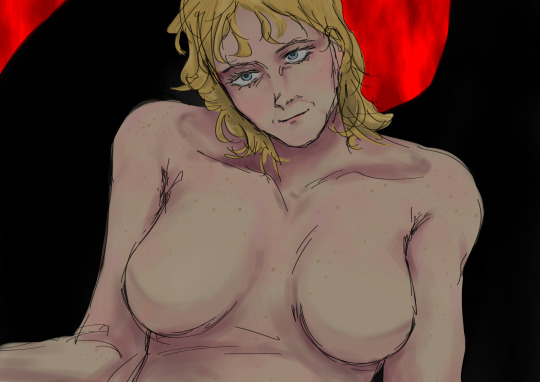
nude.
#gwendoline christie#lucifer morningstar#my art#sketch#im sorry i didint draw their pepperonis cuz i rlly dont know how to#doing this instead of doing warm ups for upcoming essay exam lol#anatomy are out of the window#sketch warmup#im still in my finals btw#lucifer sandman
35 notes
·
View notes
Text
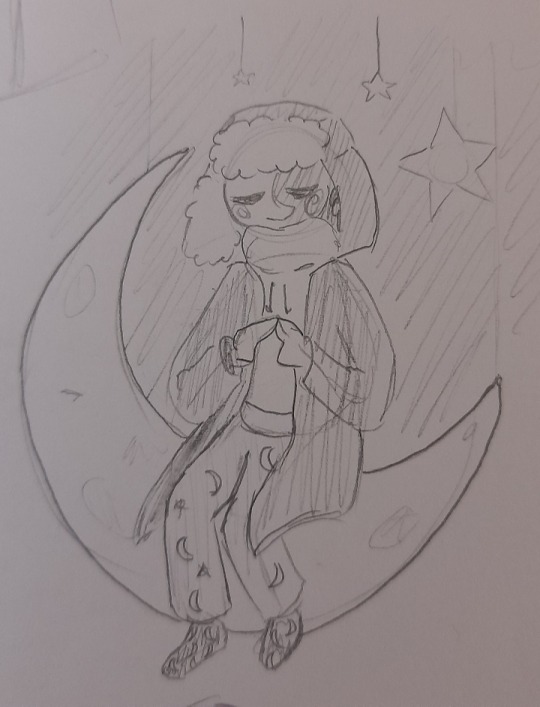
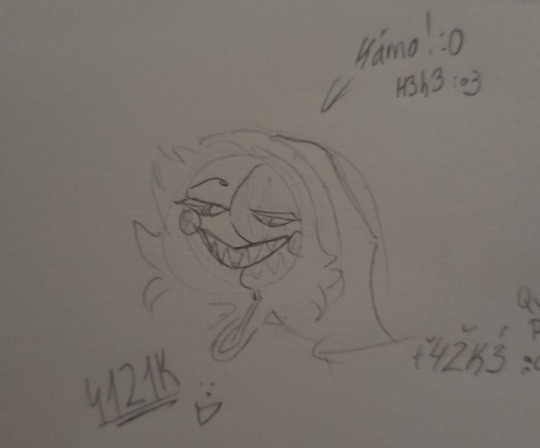
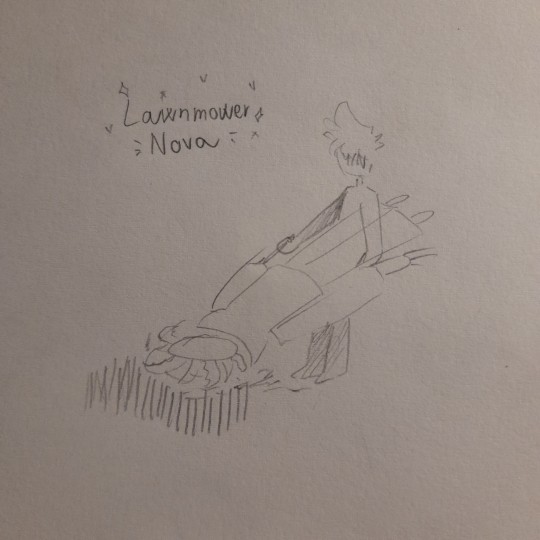
Just some GITM server stuff
All characters belong to @/venomous-qwille
#gitm au#gitm#ghost in the machine au#ghost in the machine#gitm nova#gitm sandman#gitm misuta#fnaf#fnaf dca#bee doodles#bee draws#i am so in love with them wawa#ngl it is so much fun I actually draw and I didnt for 3 years like BUDDY-#grah blorbos such blorbos waa#waaa#WAAAA#Writing essays in the tags lmao
63 notes
·
View notes
Text
Part 6: “I reject your reality, and substitute my own”: Maybe There is Hope After All
Note: this is a part of my essay "The Awkward Meta-Tragedy of Neil Gaiman's The Sandman", see [here] for the masterpost of all links, reading order, and content warnings.
Well, despite everything the author might have possibly intended, I still do care about Morpheus and his fate. To paraphrase Ludo’s 2008 album title, “He’s awful, I love him.”
And that’s part of why the most common interpretation of his ending—as both a fully planned suicide and a tragedy—disturbed me so much. At best I could metaphorically “scoot” it around to interpret it as a traditional tragedy where his fatal flaw was his inability to seek help/treatment or cope with his issues, and thus the warning to the audience is a positive one to seek help if you’re struggling. Once again, though, given the way depression sometimes works, that still feels vaguely close to victim-blaming.
Another way to get around the unfortunate implications would be if his death was not, in fact, a carefully planned suicide. Maybe he just fucked up enough that eventually the various things he fucked up all stacked properly to be his downfall without any intent involved? But, that does raise the huge question of who got Loki to kidnap Daniel, provoking Lyta and thus causing the rest of the dominoes to topple. In the suicide interpretation it’s implied to be Morpheus himself who intentionally set the situation in place; without that explanation that’s an odd open thread left. But still, an accidental buildup of issues rather than intentional suicide would make things a lot less uncomfortable. Somehow, “you can do everything you can to change and still have negative and destructive consequences come your way” or “you can try your best and still fail” feels more reassuring than the alternative of “he did change, but he still decided to die—in the end, it didn’t even matter.”
Totally replacing a dead loved one still feels weird, regardless of their manner of death; I don’t think there’s any way around that. But, at least if it was not a suicide, then it doesn’t validate the “my family would be better off without me” sentiments that might be present in suicidal ideation.
And then, there’s the theories about how Morpheus might not be dead—at least not completely—and that he might have found peace and happiness outside of oblivion after all.
One major factor is the fact that Hob dreams about seeing Morpheus and Destruction together after the events of The Wake. While Hob himself dismisses it as “just a dream,” there’s the fact that both Morpheus in-universe and Neil Gaiman out-of-universe both insist that dreams in this series are never “just a dream.” Combine that with what I pointed out about “A Midsummer Night’s Dream” and how the story is meant to let the fae live on despite leaving Earth, and it paints an interesting possible picture.
Maybe Morpheus did find a way to leave his job after all. To live on as something else, as Morpheus rather than Dream of the Endless, as a dream or a story or a memory or a friendship, but no matter what, separate from the responsibilities that so stressed him—and with a responsible and eager successor to take up the reins in his place. Maybe Hob’s example of living through everything even showed him that changing with the times is possible. Just walking away like Destruction did wasn’t an option for him, and not just because Morpheus felt he couldn’t abandon his realm without leaving someone to be responsible. He also couldn’t just walk away because, probably, it wouldn’t be dramatic enough!
Come on, Morpheus is a (possibly literal) Drama King; of course he’s not going to quit quietly. Plus, he knows from Destruction’s example that just leaving also leaves open an eternity of the other universal powers trying to nag you into going back. What’s more dramatic, and conveniently going to prevent anyone from coming after you, than making sure everyone thinks you’re dead?
Or, well, actually dying. Sort of. I have no doubt that some aspect of Morpheus died. Perhaps the aspect that was Dream of the Endless, died, but, as I mentioned, left Morpheus to live on separately in some other form. “You cannot kill an idea” can go both ways; it can mean that we’re not supposed to care that Morpheus is dead, or it can mean that Morpheus lives on. He, as an independent identity, with a specific name he has chosen, is also an idea. If the question is “change or die,” it obscures the fact that this is also a universe where people can change by death.
Heck, there’s even an example in this series of people deciding to finally live upon finding themselves post-life. Chapter 4 of Season of Mists introduces the Dead Boy Detectives. At first, much like “Façade,” this chapter seems to have little to do with the overarching story; besides showing how bad it is to have the formerly hell-bound dead returning to Earth and featuring a cameo by Death, there’s little to connect it to the primary narrative. The majority of it is just about two random boys dealing with supernatural bullies, and both ending up having been murdered by the bullies at the end. But, the story ends on the fact that they choose to “make the most of their afterlives.” They leave behind the crappy situation assigned to them by their circumstances by living on in a new form (in the boys’ case, ghosts). If two random kids can do it, why can’t Morpheus do the same?
Actually, there’s a whole lot of events in Season of Mists that I’ve seen propped up as evidence that Morpheus was settling his circumstances to prepare for his suicide, but I believe can just as easily be interpreted otherwise. It could either be him setting up backup plans in case of his accidental imprisonment or death, or even intentional preparations for a successor to take over for him when he dramatically retires rather than straight-up dies. I could fill an entire other essay with that evidence; I planned to include it here but my page count is already far exceeding what I intended, so I’ll save that for a possible later time. If anyone reading made it this far, let me know if you’d like to read that!
So, do I believe in these more optimistic interpretations of the ending? In terms of authorial intent, I’m not sure. I think there’s certainly a reason everything seemed so shockingly pessimistic at first read, and possibly that was the intent. The books were written at a different time, when the author was at a different place in his life. But stories are also about belief. And when the author straight up says that it’s open to interpretation, well… I’d rather choose to believe that this grand, sweeping, thought-provoking narrative isn’t about an irredeemable depressed asshole being rewarded for suicide, with the reader being scolded for caring.
Perhaps asking whether or not that’s “true” is missing the point.
#the sandman#the sandman comics#the sandman spoilers#the sandman comics spoilers#neil gaiman's sandman#the sandman comics meta#the sandman comics analysis#literary analysis#my writing#sandman essay
88 notes
·
View notes
Text
OK, so I'll openly admit to getting a little obsessed with this headcanon. But but but... My expanded theory on Hob as successor to Father Time and Dream as the next Night.
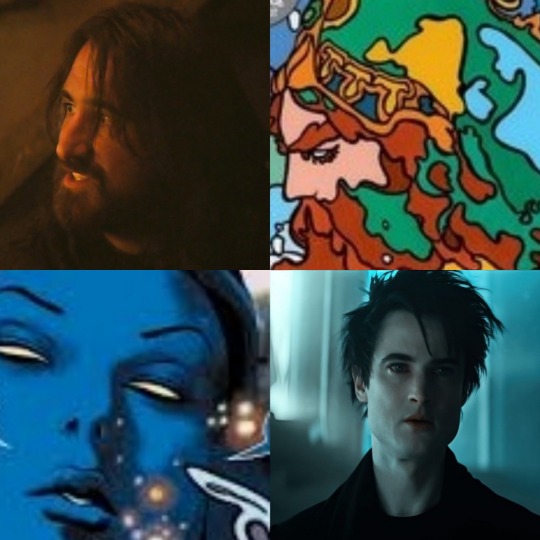
So the Why... Hob is Hope and Delight and Curiosity and all those things people have called him in abundance. But what this all accumulates to is he loves 'LIFETIME'. He appreciates the time he has. Every second of it! The good and the bad. The memories of the past, the everyday wonders of the present, the potential of the future. He doesn't waste a minute of it. He respects and revels in Time. It's his one true gift, Hob has Time and makes a masterpiece of it.
And the How... the Greeks, (who seem to be really up on their Endless know how in their own way) had three divine representations of time..
1.The first, Opportunity, luck and favorable moments.
2. The next level is Eternity, The Zodiac /The turning of time/months/seasons etc
3. Finally the Big Dog, Time itself.. Past, Present, Future
So we say that's the three stages a new Time will journey through.
Hob is literally 'birthed' as Time's successor through 'opportunity'. A case of gets cocky at the right place, right time and boom... In that instance, Death withholds her gift, and after some bargining with dear old dad. Father Time pours himself into Hob to stop the age and decay of his mortal body. Too much of himself. The process of one Time fading and one Time ascending begins!
Say from that point on the power of opportunity is Hobs, even though he doesn't know it. Things just work for him and those he cares about. Who's ever side he's fighting on in a battle 'will' win. The printing press for example, he joins it as a no hope career then it explodes! Hob just puts it down to good luck and a can do attitude.
By the End of the 1500s he's slowly evolving into the next stage, Eternity. Learning to respect the natural cycle of time, the change of the seasons, with life comes death...Yeah, this stage starts with a hard lesson.
So by this point, the power of life, memory and time are all slowly building up within Hob. Every turn of the wheel that passes for him, it grows. Now this could take centuries to come to fruition. But over the years, not that he'd notice, say, the seasons seem to be perfect wherever he goes. His memory, even as an immortal shouldn't be able to withtain everything he's been through. But he has perfect recall of everything from 1389 onwards. Maybe people around him get that little extra boost for experiencing life in the time they have. I also love the idea of the embodiements of the Zodiac being at his unknowing beck and call. He's sat talking to a crab and is like, "Let's have a good July this year. What do you think little crab?" And Cancer replies in crab... 'Ofcourse my liege!' and skuttles off to see to it immediately.
Final stage, Time itself. Learning to be and master Past, Present and Future... Where the fun really starts.
Hob waking up a different age every day of the week until he gets a handle on it.
Accidentally trapping himself in a time loop beacuse he was so focused on how a situation could have played out better.
Wishing he could have been there to help Dream and suddenly find himself standing outside of Fawney Rig in the 1920. And having seen enough movies to know he can't change anything. Even though he wants to more then anything.
Sneezing too hard and ending up in a different universe 100 years in the future. And having to call on a very white and definitely not 'his' Dream of the Endless to find his way back.
Hob may be starting to realise somethings a miss by now...
....................................................................
As for Dream becoming Night. Of all the Endless Siblings, Dream is the closest in function to Mother Night. While you can certainly dream during the day. Sleep and Night generally go hand in hand. He also seems to have taken for her the most in appearance if those starry eyes are anything to go by..
But well, the moment Hob decided, 'That's the anthropomorphic personification I'm going to marry!' his fate was sealed. Time HAS to have a Night. Mummy dearest is now slowly on the wane as her power slowly passes to her son.
I doubt Dream would notice any major changes for a while. He's got a lot on his plate to contend with after all. But maybe little things...
One morning he's snuggling with Hob and the dawn sunlight beams straight into his eyeballs. And Dream thinks, 'Go away...' And suddenly it's night again until his highness deems it time to get up.
The Stars in their masses start to visit the Dreaming to pay their respects to Dream. Which is all very nice, but he has absolutely no idea why its happening.
Dream is regarding himself in the mirror and notices his skin is starting to ever so slighlty sparkle. Thinks, 'I am getting old, I'm turning into my Mother.' Yup, quite literally duck. 😆
................................................
Then we come to the events of 'The Wake'. But a different kind of death awaits Dream, that of transformation. Daniel becomes Dream, Dream becomes Night. Hob ascends as the new Time... And Father Time and Mother Night's A* parenting comes back to bite them in some truly cosmic level karma.
#dreamling#dream of the endless#hob gadling#the sandman#father time#mother night#TimeHob#DreamNight#hob x dream#hob x morpheus#Thank you for getting to the end of that essay#I'm going to go lay down now 😆
270 notes
·
View notes
Text
Day 30 - Bakery
[AO3]
“This is where you work now?” A deep, familiar voice says and Hob resists the urge to jump and swear, feeling Dream’s presence nearby as he focuses that the mixing bowls and utensils are clean and in their place for the day shift of the bakery. Even in space, and the fact that capitalism is no longer a thing, and yet things like bakeries persist to bring people fresh bread and desserts is comforting. Sighing, he turns around to see Dream, standing in place as blue eyes flick around.
“Yep,” he smiles, which melts into a frown as Dream looks him up and down, the plain black shirt and pants and apron, the steel-toed boots looked at critically. Dream has a particular expression on his face. “What?”
Dream tilts his head, stepping closer as Hob leans against the stainless steel countertop. “Aren’t you meant to be covered in flour or batter?”
Hob groans, scratching his forehead. “Actually, me being so clean after a full shift of kneading bread and making cakes means I’m at least decent at this job,” he huffs. “My teacher’s when I went to get into this industry drilled it into my head,” he pouts, crossing his arms. Sure, the messy baker with flour on their face and clothes is cute in fiction, but not true to real life, especially in a professional capacity. Home-style, maybe.
Dream frowns and gives him a once-over again, eyes like a brand. “You have flour on your shoes.”
“I always end up with something on my shoes,” Hob sighs and rolls his eyes, stepping forward so he can put his arms around Dream’s waist, “nothing a splash of water won’t fix.”
“And how much longer do you plan to live on this station?” Dream asks, looking around the bakery critically, a small window showing Mars outside, as well as the Milky Way.
“Until they make an all-black space station for my partner, of course,” he drawls, grinning as Dream glares at him, lips pinched. “Are you here to take me home?” He asks, looking around the bakery as he makes sure that everything is in place, and he mopped and cleaned the place nicely for the next shift.
Dream hmphs, hands coming up to frame his face as Dream pulls him into a kiss, eyes melting from a blue to black and stars, a stroke of the Milky Way being shown as Dream pulls away ― and pushes him down onto his bed. Hob hadn’t even noticed, mind only focusing on Dream’s lips and tongue as they kissed. “Surely you will not object to your clothes getting dirty now,” Dream purrs, slithering into his lap.
“That’s what the laundry is for,” he croaks, his hands going up and under Dream’s shirt, scraping pale skin as they kiss more, deep and indulgent as Dream grabs onto his jaw, black nails digging into his beard. The spark of arousal is there, slow and soft as they kiss ― and then Dream grounds down onto him, making him wheeze into Dream’s mouth as his cock gets rapidly interested in the proceedings. “Dream,” he whines as Dream pushes him flat onto the bed.
Above him, Dream smirks, one hand taking off Hob’s shirt while the other unbuttons his pants, cupping his dick roughly, and Hob shivers as a finger presses against his balls, stroking them. “It will be a delight,” Dream whispers, voice hooking deep inside his guts, cock twitching as Dream bites at his collarbone. Hob whimpers, clutching at Dream’s hair desperately as Dream nips down his chest, tongue swirling around his nipples, then down― “to mess up such a man, so good at his job.”
Hob shivers, gasping and closing as a pink mouth reaches his cock, eyes full of the Milky Way staring up at him as Dream swallows him. Hob can only pant and moan Dream’s name as Dream sucks him to a maddening orgasm.
#dc#the sandman#dreamling#dreamling fanfic#dreamling smeptember#smeptember 2023#dream x hob#hob x dream#hob x morpheus#writing#not sfw#in this essay i will say in my capacity of what pro baking knowledge i have as to why the 'messy baker' makes me angry-#also. everytime after baking class. always flour or smth on my shoes smh#then had to clean them for the next time bc they always wanted us to Look Presentable with ironed chef outfit and clean shoes#so anyway#bakery but in space also bc i wanted scifi
41 notes
·
View notes
Text
The Corinthian, recreated, owes his life to Daniel (for it's solely for the purpose of finding and protecting Daniel that he's alive agin) just as Daniel is brought to safety thanks to the Corinthian (so he owes his salvation to the Nightmare). There is something extraordinarily beautiful in the relationship of these two creatures so deeply bound by life (of each other) and by death (of Morpheus).
From this point of view, how different is the "journey" of the second Corinthian from the first. The First takes advantage of his creator's absence to escape and attempt to shape the world according to his personal vision (in the TV show, this escape, this betrayal, is then further extremized by the far more active role that the Corinthian has in all this). The Second's "journey" is not an escape, but rather a search, a rescue mission that at times even takes on the aspect of a "police" investigation. The action is therefore not one of distancing but of approaching.
And if the First, faced with the dramatic final confrontation with his creator, tries in a last, desperate impulse to strike (injure, kill) Morpheus, the Second physically places himself between Death and Daniel, with the aim of protecting him even at the cost of his life.
This is not slavish loyalty: in the chaos of a personality frayed by the weighty memories of the past (that's all I have, says the Corinthian), Daniel is the only fixed point, the raison d'être from which everything starts.
#the sandman#the corinthian#daniel hall#random thoughts#corinthiel#me writing academic essays on my blorbos
34 notes
·
View notes
Note
#jsyk i WILL be writing hob/destruction in the new year
YESSSSSSSSS
Listen you guys, my fellow show watchers, comic illiterates - listen - Destruction is great. He is GREAT. Here are some Destruction of the Endless Facts™ from comic panels*:
Tall
Big
Ginger
Okay but seriously - truly - he appears, right, in panels with Hob, and Hob, our Strapping Hob, our Soldiering-and-Banditry-Hob, comes up to his shoulder. The tip-top of his head reaches Destruction's shoulder. The man is built like a brick shithouse. The man's daily caloric requirements are 40 chickens or an entire cow, but he also seems like the sort who would refuse to buy meat from a grocery store. He's got a Conscience. He's a tender one. Terribly earnest, and less shy about it than Hob.
What else? He's terrible at art. Tries his hand at loads of it. Hob insults it. Lots of characters do. I think he's just not found the right medium or style yet. He is The Prodigal referenced in the show - he quit in 1718. He saw all the possibilities for destruction in Science and didn’t want to govern over That.
Like Hob, he confidently holds a slightly insane belief, and the rest of the world must simply bend around it. Hob's is that he won't die. Destruction's is that he can abscond from his post. He is not the custodian of destruction, mind, but its very embodiment. Just as Hob, a human, is the embodiment of mortality. Still, they both say. Not for us. You can't do that, say others. Just watch me, they say. I'll leave. I'll live. The other option is unbearable in a way that nobody around them seems to really understand.
I think Destruction is the most classic foil to Dream. He believes in the importance of change. Of self-knowledge. Dream is martyred to his function, and while Death counsels him to find joy in his role, Destruction would probably counsel him to fuck off for a month and take up ceramics.
Hob and Destruction are of a kind, and I think there's some really neat opportunities for tension between them, but mostly, I think, they would find the other one SUCH A BALM. A kindred spirit. Somebody else who wants more than what they were handed; somebody else who subscribes to the Church of Change; somebody else who is wandering, unmoored, who loves the ones they've left behind but couldn't stay; somebody else who is worried for Morpheus!
*i have looked at approx 4 panels this is largely vibes
#the sandman#destruction of the endless#destruction x hob#an essay#i barely know this man but i love him#struggles with perspective in art but not in life#rippling forearms and stupid little ponytail#gets paint all over his slutty open shirt#has a talking dog#takes care of delirium#hob could climb him like a tree#the sandman comics spoilers
247 notes
·
View notes
Text
fucking OBSESSED with orpheus being dream and calliope's son and the detail that calliope blamed morpheus for his death is sending me bc it's like. taking the myth interpretation where orpheus looks back out of excitement, out of hope and out of love, and eurydice smiles, and doesn't blame him, because she knows she's so loved — like that orpheus as dream and calliope's kid, and the sheer power of a parallel that makes with dream. orpheus, who is full of hope, who's flaw is loving too much; and dream, who is, arguably, humanity's hope personified ("i am hope") and who's greatest flaw, too, is loving too much
#SCREAMING#literally I have not stopped thinking about this for DAYS#it's just SOOOOO#so layered so nuanced so fucking chef kiss#losing my fucking mind#there is NOTHING I love more than a man who's flaw is love#love - and hope - which both apply so SO strongly here#in this essay i will#i fucking WILL#sandman#the sandman#dream of the endless#dream and calliope#morpheus/calliope#brahe speaks#brahe loses her mind actually#i did not articulate this well but im losing my fucking mind!!!!!
203 notes
·
View notes